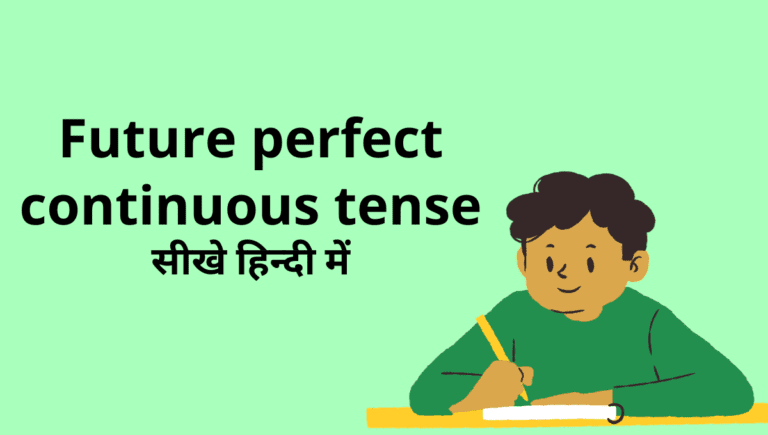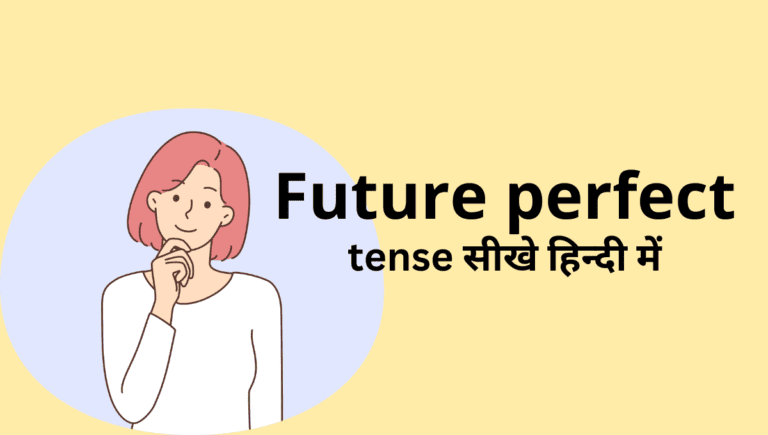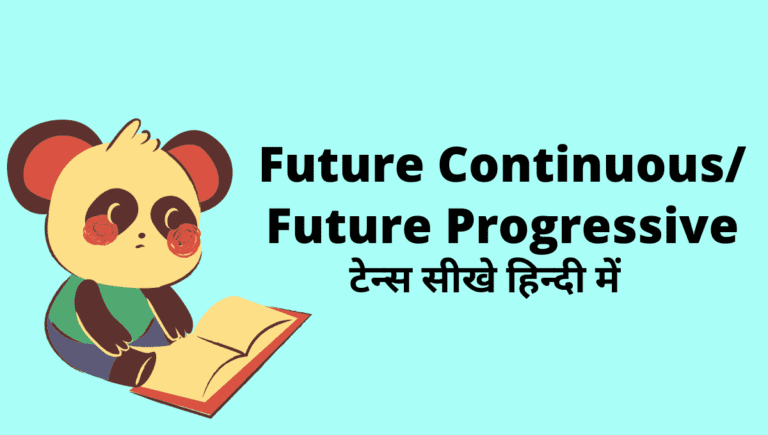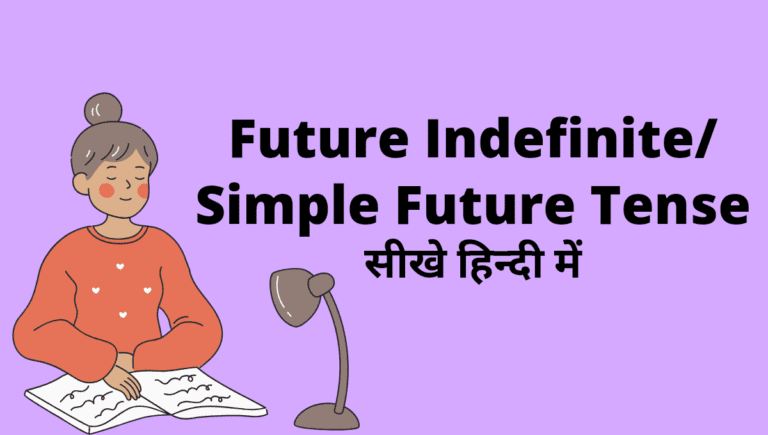इस पोस्ट (future perfect continuous tense in hindi) में हम future perfect continuous tense को हिन्दी में सीखेंगे। हम future perfect continuous tense की परिभाषा (definition), नियम (rules), सूत्र (formulas) और वाक्यों में उपयोग (future perfect continuous tense sentences in hindi) भी सीखेंगे।
इससे पहले हमने Future Perfect Tense को सीखा था। तो चलिए इस पोस्ट में future perfect continuous tense को बहुत ही आसान भाषा में समझते है।
Future perfect continuous tense in Hindi
Future perfect continuous tense (पूर्ण-अपूर्ण भविष्यकाल), future tense (भविष्यकाल) का चौथा टेन्स है, जैसा की आप नीचे देख सकते है:
भविष्यकाल (future tense) के चार प्रकार –
- Future indefinite tense (अनिश्चित भविष्यकाल)
- Future continuous tense (अपूर्ण भविष्यकाल)
- Future perfect tense (पूर्ण भविष्यकाल)
- Future perfect continuous tense (पूर्ण-अपूर्ण भविष्यकाल)
Future perfect continuous tense की परिभाषा
पूर्ण-अपूर्ण भविष्यकाल की परिभाषा – वह टेन्स जिसमे कार्य भविष्यकाल (यानि आने वाले समय) में लगातार कुछ समय तक जारी रहता है, वहाँ पूर्ण-अपूर्ण भविष्यकाल (future perfect continuous tense) होता है।
पूर्ण-अपूर्ण भविष्यकाल में काम किसी भी काल (वर्तमानकाल, भूतकाल, भविष्यकाल) में शुरू हो सकता है, बस खत्म भविष्यकाल में होता है।
जैसे –
- वह 2 घंटे से परीक्षा दे रहा होगा। (He will have been taking the exam for 2 hours.)
- मैं कल सुबह से ऑफिस में काम कर रहा होऊंगा। (I shall have been working in the office since tomorrow morning.)
ऊपर दिए गए वाक्यों में आप देख सकते है की काम भविष्यकाल में लगातार जारी है।
Future perfect continuous tense meaning in Hindi
Future perfect continuous tense का हिंदी अर्थ होता है- “पूर्ण-अपूर्ण भविष्यकाल”।
Future perfect continuous tense की पहचान
जिन हिन्दी वाक्यों के अंत में रहा होगा, रहे होंगे, रही होगी, रहा हूँगा, रही हूँगी आदि शब्द आते है, और समय दिया हुआ होता है। वहाँ future perfect continuous tense होता है।
सरल शब्दों में कहे तो future perfect continuous tense में काम किसी काल (भूतकाल, वर्तमानकाल, भविष्यकाल) मे शुरू होता है, भविष्य में कुछ समय तक लगातार चलता है और भविष्य में ही खत्म होता है।
जैसे- “मै 2 बजे से अखबार पढ़ रहा होंगा।” इस वाक्य में, मै आने वाले समय में अखबार पढ़ूँगा जो की लगातार होने वाला काम है।
Future perfect continuous tense का उपयोग
इस टेन्स का उपयोग करते समय हमे निम्न बातों का ध्यान रखना चाहिए:
- इस टेन्स में verb की 1st form के साथ हमेशा ing का उपयोग किया जाता है।
- इस टेन्स में helping verb के रूप में will have been/shall have been का उपयोग क्रिया (verb) के ठीक पहले किया जाता है।
- Will have और shall have का प्रयोग –
- Shall have का प्रयोग first person यानी I और we के साथ किया जाता है।
- Will have का प्रयोग second person यानी you और third person यानी he, she, it, name, they के साथ किया जाता है।
- समय को बताने के लिए since और for का उपयोग किया जाता है। जहां –
- Since – Since का उपयोग निश्चित समय के लिए किया जाता है, जैसे: 8 o’clock, 1962, morning, etc.
- For – For का उपयोग अनिश्चित समय के लिए किया जाता है, जैसे: Years, four hours, threaten minutes, etc.
Note: सामान्यत इस टेंस के सभी वाक्यों में will have been का उपयोग किया जा सकता है, तो आप कन्फ्यूज ना हो।
Future perfect continuous tense के formulas

Subject + will/shall + have + been + verb 1st form + ing + object + since/for + time. (for positive sentence)
Subject + will/shall + not + have + been + verb 1st form + ing + object + since/for + time. (for negative sentence)
Will/Shall + subject + have + been + verb 1st form + ing + object + since/for + time? (for interrogative sentence)
Will/Shall + subject + not + have + been + verb 1st form + ing + object + since/for + time? (for interro-negative sentence)
{Or}
Will not (won’t)/Shall not (shan’t) + subject + have + been + verb 1st form + ing + object +since/for + time? (for interro-negative sentence)
Types of sentences in “Future perfect continuous tense”
Future perfect continuous tense के वाक्यों को चार भागों में बाँटा जा सकता है:
- Positive sentence (सकारात्मक वाक्य)
- Negative sentence (नकारात्मक वाक्य)
- Interrogative sentence (प्रश्नवाचक वाक्य)
- Negative Interrogative sentence (नकारात्मक प्रश्नवाचक वाक्य)
Positive sentence
Formula
Subject + will/shall + have + been + verb 1st form + ing + object + since/for + time.
Example in Hindi and English
1.) टीना कल सुबह से खाना बना रही होगी।
1.) Tina will have been cooking since tomorrow morning.
2.) रात से पंखा चल रहा होगा।
2.) The fan will have been running since night.
3.) वे 5 साल से इस स्कूल में पढ़ा रहे होंगे।
3.) They will have been teaching in this school for 5 years.
4.) मै सोमवार से मंदिर जा रहा होऊंगा।
4.) I shall have been going to the temple since Monday.
5.) वह कई दिनों से मुझसे बात करने की कोशिश कर रही होगी।
5.) She will have been trying to talk to me for several days.
ऊपर दिए गए वाक्यों मे आप देख सकते है, की हमने will have been/shall have been और verb की 1st form के साथ ing का उपयोग किया है। और समय को दर्शाने के लिए since/for का उपयोग किया है।
Negative sentence
Formula
Subject + will/shall + not + have + been + verb 1st form + ing + object + since/for + time.
Example in Hindi and English
1.) टीना कल सुबह से खाना नहीं बना रही होगी।
1.) Tina will not have been cooking since tomorrow morning.
2.) रात से पंखा नहीं चल रहा होगा।
2.) The fan will not have been running since night.
3.) वे 5 साल से इस स्कूल में पढ़ा नहीं रहे होंगे।
3.) They will not have been teaching in this school for 5 years.
4.) मै सोमवार से मंदिर नहीं जा रहा होऊंगा।
4.) I shall not have been going to the temple since Monday.
5.) वह कई दिनों से मुझसे बात करने की कोशिश नहीं कर रही होगी।
5.) She will not have been trying to talk to me for several days.
ऊपर दिए गए वाक्यों मे आप देख सकते है, की हमने will have been/shall have been के साथ not और verb की 1st form के साथ ing का उपयोग किया है। और समय को दर्शाने के लिए since/for का उपयोग किया है।
Interrogative sentence
Formula
Will/Shall + subject + have + been + verb 1st form + ing + object + since/for + time?
Note- Interrogative sentence में हमेशा प्रश्नवाचक चिन्ह (?) लगता है।
Example in Hindi and English
1.) क्या टीना कल सुबह से खाना बना रही होगी?
1.) Will Tina have been cooking since tomorrow morning?
2.) क्या रात से पंखा चल रहा होगा?
2.) Will the fan have been running since night?
3.) क्या वे 5 साल से इस स्कूल में पढ़ा रहे होंगे?
3.) Will they have been teaching in this school for 5 years?
4.) क्या मै सोमवार से मंदिर जा रहा होऊंगा?
4.) Shall I have been going to the temple since Monday?
5.) क्या वह कई दिनों से मुझसे बात करने की कोशिश कर रही होगी?
5.) Will she have been trying to talk to me for several days?
ऊपर दिए गए वाक्यों मे आप देख सकते है, की हमने will have been/shall have been और verb की 1st form के साथ ing का उपयोग किया है।, समय को दर्शाने के लिए since/for का उपयोग किया है। और अंत में प्रश्नवाचक चिन्ह (question mark) लगाया है।
Negative interrogative sentence
Formula
Will/Shall + subject + not + have + been + verb 1st form + ing + object + since/for + time?
{Or}
Will not (won’t)/Shall not (shan’t) + subject + have + been + verb 1st form + ing + object +since/for + time?
Note-
- Will not को शॉर्ट में won’t और shall not को shan’t कहते है।
- Negative interrogative sentence में हमेशा प्रश्नवाचक चिन्ह (?) लगता है।
- Negative interogative sentence को interro-negative sentense भी कहते है।
Example in Hindi and English
1.) क्या टीना कल सुबह से खाना नहीं बना रही होगी?
1.) Will Tina not have been cooking since tomorrow morning?
(or) Won’t Tina have been cooking since tomorrow morning?
2.) क्या रात से पंखा नहीं चल रहा होगा?
2.) Will the fan not have been running since night?
3.) क्या वे 5 साल से इस स्कूल में पढ़ा नहीं रहे होंगे?
3.) Will they not have been teaching in this school for 5 years?
4.) क्या मै सोमवार से मंदिर नहीं जा रहा होऊंगा?
4.) Shall I not have been going to the temple since Monday?
(or) Shan’t I have been going to the temple since Monday?
5.) क्या वह कई दिनों से मुझसे बात करने की कोशिश नहीं कर रही होगी?
5.) Will she not have been trying to talk to me for several days?
ऊपर दिए गए वाक्यों मे आप देख सकते है, की हमने will have been/shall have been के साथ not और verb की 1st form के साथ ing का उपयोग किया है।, समय को दर्शाने के लिए since/for का उपयोग किया है। और अंत में प्रश्नवाचक चिन्ह (question mark) लगाया है।
Future perfect continuous tense examples in Hindi
Future perfect continuous tense को और भी अच्छे से समझने के लिए आप कुछ और फ्यूचर परफेक्ट कंटीन्यूअस टेंस के हिन्दी उदाहरण (future perfect continuous tense examples in Hindi) नीचे देख सकते है:
1.) बच्चे रात से परीक्षा की तैयारी कर रहे होंगे।
1.) Children will have been preparing for the exam since night.
2.) मै 2 साल से उसके बारे मे सोच रहा होगा।
2.) I shall have been thinking about her for 2 years.
3.) क्या हम सब 1 महीने से एक दूसरे को याद नहीं कर रहे होंगे?
3.) Shan’t we all have been missing each other for 1 month?
4.) वह तुम्हें कई दिनों से अपनी किताब नहीं दे रहा होगा।
4.) He will not have been giving you his book for many days.
5.) मेरे चाचा 5 दिनों से बहाने बना रहे होंगे।
5.) My uncle will have been making excuses for 5 days.
6.) गौतम 4 घंटे से अपनी मम्मी के लिए साड़ी खरीद रहा होगा।
6.) Gautam will have been buying a saree for his mother for 4 hours.
7.) क्या मेरा दोस्त मुझे पिछले 15 मिनट से कॉल कर रहा होगा?
7.) Will my friend have been calling me for the last 15 minutes?
8.) दुकानदार सुबह से अपनी दुकान चला रहा होगा।
8.) The shopkeeper will have been running his shop since morning.
9.) सभी विद्यार्थी 5 बजे से मैच खेल रहे होंगे।
9.) All the students will have been playing the match since 5 o’clock.
10.) क्या तुम्हारा भाई 10 मिनट से हमारी बातें सुन रहा होगा?
10.) Will your brother have been listening to us for 10 minutes?
Future perfect continuous tense FAQS
Future tense (भविष्यकाल) चार प्रकार के होते है –
1.) Future indefinite tense(अनिश्चित भविष्यकाल)
2.) Future continuous tense (अपूर्ण भविष्यकाल)
3.) Future perfect tense (पूर्ण भविष्यकाल)
4.) Future perfect continuous tense (पूर्ण-अपूर्ण भविष्यकाल)
जिन हिन्दी वाक्यों के अंत में रहा होगा, रहे होंगे, रही होगी, रहा हूँगा, रही हूँगी आदि शब्द आते है, और समय दिया हुआ होता है। वहाँ future perfect continuous tense होता है।
सरल शब्दों में कहे तो future perfect continuous tense में काम किसी काल (भूतकाल, वर्तमानकाल, भविष्यकाल) मे शुरू होता है, भविष्य में कुछ समय तक लगातार चलता है और भविष्य में ही खत्म हो जाता है।
फ्यूचर कंटीन्यूअस टेन्स में हेल्पिंग वर्ब के रूप में will have been/shall have been का उपयोग किया जाता है।
और इनका उपयोग इस प्रकार किया जाता है-
Will have been – He, she, it, name, you, they के साथ।
Shall have been – I, we के साथ।
Conclusion
इस पोस्ट (future perfect continuous tense in hindi) में हमने future perfect continuous tense को बहुत ही आसान भाषा में सीखा। हमने future perfect continuous टेन्स की परिभाषा (future perfect continuous tense definition), उपयोग (uses of future perfect continuous tense) और इसके वाक्यों में उदाहरण (examples of future perfect continuous tense in hindi) भी समझे।
आपको यह पोस्ट (future perfect continuous tense in hindi) कैसी लगी हमें comment मे जरूर बताए। और अगर आपका इस पोस्ट से संबंधित कोई सवाल या सुझाव हो तो आप हमसे कमेन्ट में पूछ सकते है।
हमसे जुड़े रहने के लिए आप हमे Instagram और Facebook पर भी फॉलो कर सकते है-
- Instagram – @english_learner_podcast
- Facebook – @English learner podcast
इस तरह की और भी पोस्ट पढ़े –
Future Tense (भविष्यकाल)




